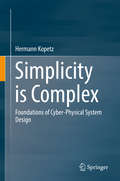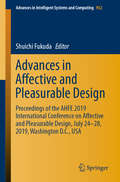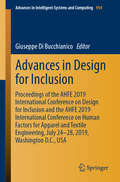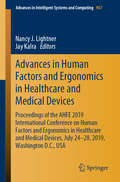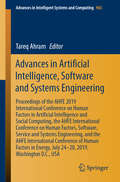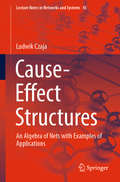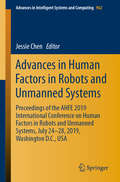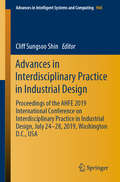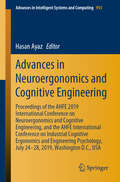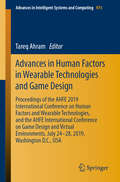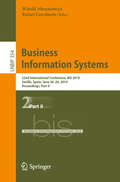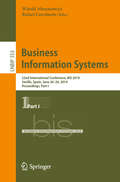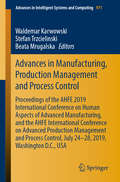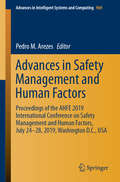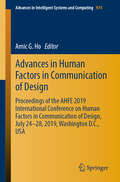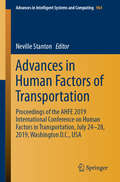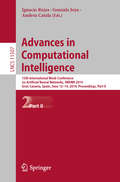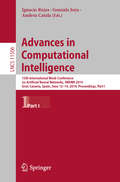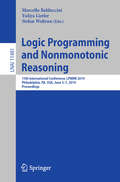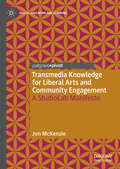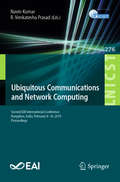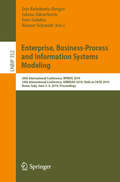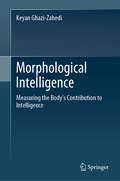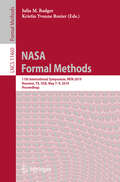- Table View
- List View
Simplicity is Complex: Foundations of Cyber-Physical System Design
by Hermann KopetzThis book investigates the characteristics of simple versus complex systems, and what the properties of a cyber-physical system design are that contribute to an effective implementation and make the system understandable, simple to use, and easy to maintain. The targeted audience is engineers, managers and advanced students who are involved in the design of cyber-physical systems and are willing to spend some time outside the silo of their daily work in order to widen their background and appreciation for the pervasive problems of system complexity.In the past, design of a process-control system (now called cyber-physical systems) was more of an art than an engineering endeavor. The software technology of that time was concerned primarily with functional correctness and did not pay much attention to the temporal dimension of program execution, which is as important as functional correctness when a physical process must be controlled. In the ensuing years, many problems in the design of cyber-physical systems were simplified. But with an increase in the functional requirements and system size, the complexity problems have appeared again in a different disguise. A sound understanding of the complexity problem requires some insight in cognition, human problem solving, psychology, and parts of philosophy.This book presents the essence of the author’s thinking about complexity, accumulated over the past forty years.
Advances in Affective and Pleasurable Design: Proceedings of the AHFE 2019 International Conference on Affective and Pleasurable Design, July 24-28, 2019, Washington D.C., USA (Advances in Intelligent Systems and Computing #952)
by Shuichi FukudaThis book discusses the latest advances in affective and pleasurable design. It reports on important theoretical and practical issues, covering a wealth of topics including aesthetics in product and system design, design-driven innovation, affective computing, evaluation tools for emotion, Kansei engineering for products and services, and many more. Based on papers presented at the AHFE 2019 International Conference on Affective and Pleasurable Design, held on July 24–28, 2019, in Washington DC, USA, the book provides an inspiring guide for all researchers and professionals in the field of design, e.g. industrial designers, emotion designers, ethnographers, human–computer interaction researchers, human factors engineers, interaction designers, mobile product designers, and vehicle system designers.
Advances in Design for Inclusion: Proceedings of the AHFE 2019 International Conference on Design for Inclusion and the AHFE 2019 International Conference on Human Factors for Apparel and Textile Engineering, July 24-28, 2019, Washington D.C., USA (Advances in Intelligent Systems and Computing #954)
by Giuseppe Di BucchianicoThis book addresses a range of topics in design, such as universal design; design for all; digital inclusion; universal usability; and accessibility of technologies regardless of users’ age, financial situation, education, geographic location, culture and language. It especially focuses on accessibility for people with auditory, cognitive, neurological, and visual impairments, ageing populations, and mobility for those with special physical needs. The book explores some of the overlaps between inclusive design and web accessibility to help managers, designers, developers, policy makers, and researchers optimize their efforts in these areas. Based on the AHFE 2019 International Conference on Design for Inclusion, held on July 24-28, held in Washington D.C., USA, it discusses new design technologies and highlights the disparate needs of the individuals within a community. Thanks to its multidisciplinary approach, it provides readers with various backgrounds with a timely, practice-oriented guide to design for inclusion.
Advances in Human Factors and Ergonomics in Healthcare and Medical Devices: Proceedings of the AHFE 2019 International Conference on Human Factors and Ergonomics in Healthcare and Medical Devices, July 24-28, 2019, Washington D.C., USA (Advances in Intelligent Systems and Computing #957)
by Nancy J. Lightner Jay KalraThis book explores how human factors and ergonomic principles are currently transforming healthcare. It reports on the design of systems and devices to improve the quality, safety, efficiency and effectiveness of patient care, and discusses findings on improving organizational outcomes in the healthcare setting, as well as approaches to analyzing and modeling those work aspects that are unique to healthcare. Based on papers presented at the AHFE 2019 International Conference on Human Factors and Ergonomics in Healthcare and Medical Devices, held on July 24–28, 2019, in Washington, DC, USA, the book highlights the physical, cognitive and organizational aspects of human factors and ergonomic applications, and shares various perspectives, including those of clinicians, patients, health organizations, and insurance providers. Given its scope, the book offers a timely reference guide for researchers involved in the design of medical systems, and healthcare professionals managing healthcare settings, as well as healthcare counselors and international health organizations.
Advances in Artificial Intelligence, Software and Systems Engineering: Proceedings of the AHFE 2019 International Conference on Human Factors in Artificial Intelligence and Social Computing, the AHFE International Conference on Human Factors, Software, Service and Systems Engineering, and the AHFE International Conference of Human Factors in Energy, July 24-28, 2019, Washington D.C., USA (Advances in Intelligent Systems and Computing #965)
by Tareq AhramThis book addresses emerging issues resulting from the integration of artificial intelligence systems in our daily lives. It focuses on the cognitive, visual, social and analytical aspects of computing and intelligent technologies, highlighting ways to improve the acceptance, effectiveness, and efficiency of said technologies. Topics such as responsibility, integration and training are discussed throughout. The book also reports on the latest advances in systems engineering, with a focus on societal challenges and next-generation systems and applications for meeting them. The book is based on two AHFE 2019 Affiliated Conferences – on Artificial Intelligence and Social Computing, and on Service, Software, and Systems Engineering –, which were jointly held on July 24–28, 2019, in Washington, DC, USA.
Cause-Effect Structures: An Algebra of Nets with Examples of Applications (Lecture Notes in Networks and Systems #45)
by Ludwik CzajaThis book presents a new algebraic system whose interpretation coincides with the behaviour of Petri nets, enhanced with an inhibitory mechanism and four time models. Its goal is to provide a formal means of modelling dynamic tasks, and of testing and verifying properties, in contexts characterised by the parallel execution of actions. However, the task description differs from that of Petri nets. The algebra is a quasi-semiring, “quasi” because of its somewhat restricted distributivity axiom. Expressions of this algebra, the cause–effect structures, have a graphic presentation as nets, but with one kind of named nodes, each annotated by two expressions that specify the type of signal reception from predecessors and transmission to successors. Many structural and behavioural properties are stated with proofs, and illustrative sample tasks are included. The book is intended for all those interested or involved in parallel and distributed computing – students, researchers and practitioners alike.
Advances in Human Factors in Robots and Unmanned Systems: Proceedings of the AHFE 2019 International Conference on Human Factors in Robots and Unmanned Systems, July 24-28, 2019, Washington D.C., USA (Advances in Intelligent Systems and Computing #962)
by Jessie ChenThis book focuses on the importance of human factors in the development of safe and reliable unmanned systems. It discusses current challenges such as how to improve the perceptual and cognitive abilities of robots, develop suitable synthetic vision systems, cope with degraded reliability in unmanned systems, predict robotic behavior in case of a loss of communication, the vision for future soldier–robot teams, human–agent teaming, real-world implications for human–robot interaction, and approaches to standardize both the display and control of technologies across unmanned systems. Based on the AHFE 2019 International Conference on Human Factors in Robots and Unmanned Systems, held on July 24–28, 2019, Washington D.C., USA, this book fosters new discussions and stimulates new advances in the development of more reliable, safer, and highly functional devices for carrying out automated and concurrent tasks.
Advances in Interdisciplinary Practice in Industrial Design: Proceedings of the AHFE 2019 International Conference on Interdisciplinary Practice in Industrial Design, July 24-28, 2019, Washington D.C., USA (Advances in Intelligent Systems and Computing #968)
by Cliff Sungsoo ShinThis book provides readers with a snapshot of cutting-edge methods and procedures in industrial design, with a particular focus on human-centered and user-experience design, service design, sustainable design and applications of virtual & augmented reality. Reporting on both theoretical and practical investigations aimed at improving industrial design through interdisciplinary collaboration, it covers a wide range of topics – from design strategies to product research and planning, exhibit design, as well as new materials and color research. Based on the AHFE 2019 International Conference on Interdisciplinary Practice in Industrial Design, held on July 24–28, 2019, Washington D.C., USA, the book offers a timely guide for industrial designers, production engineers and computer scientists.
Advances in Neuroergonomics and Cognitive Engineering: Proceedings of the AHFE 2019 International Conference on Neuroergonomics and Cognitive Engineering, and the AHFE International Conference on Industrial Cognitive Ergonomics and Engineering Psychology, July 24-28, 2019, Washington D.C., USA (Advances in Intelligent Systems and Computing #953)
by Hasan AyazThis book offers a broad perspective on the field of cognitive engineering and neuroergonomics, covering emerging practices and future trends toward the harmonious integration of human operators and computer systems. It presents novel theoretical findings on mental workload and stress, activity theory, human reliability, error and risk, and neuroergonomic measures alike, together with a wealth of cutting-edge applications. Further, the book describes key advances in our understanding of cognitive processes, including mechanisms of perception, memory, reasoning, and motor response, with a special emphasis on their role in interactions between humans and other elements of computer-based systems. Based on the AHFE 2019 affiliated conference on Neuroergonomics and Cognitive Engineering, held on July 24-28, 2019, in Washington D.C., USA, it provides readers with a comprehensive overview of the current challenges in cognitive computing and factors influencing human performance.
Advances in Human Factors in Wearable Technologies and Game Design: Proceedings of the AHFE 2019 International Conference on Human Factors and Wearable Technologies, and the AHFE International Conference on Game Design and Virtual Environments, July 24-28, 2019, Washington D.C., USA (Advances in Intelligent Systems and Computing #973)
by Tareq AhramThis book focuses on the human aspects of wearable technologies and game design, which are often neglected. It shows how user-centered practices can optimize the wearable experience, thus improving user acceptance, satisfaction and engagement with novel wearable gadgets. It addresses both research and best practices in the applications of human factors and ergonomics to sensors, wearable technologies and game design innovations, as well as new findings on the integration of wearability principles with regard to: aesthetics, affordance, comfort, contextual awareness, customization, ease of use, ergonomics, information overload, intuitiveness, obtrusiveness, privacy, reliability, responsiveness, satisfaction, subtlety, user-friendliness and wearability. Gathering the outcomes of both the AHFE 2019 Conference on Human Factors and Wearable Technologies and the AHFE 2019 Conference on Human Factors in Game Design and Virtual Environments, held on July 24–28, 2019 in Washington, DC, USA, the book addresses the needs of professionals, researchers, and students whose work involves the human aspects of wearable, smart and/or interactive technologies and game design research.
Business Information Systems: 22nd International Conference, BIS 2019, Seville, Spain, June 26–28, 2019, Proceedings, Part II (Lecture Notes in Business Information Processing #354)
by Witold Abramowicz Rafael CorchueloThe two-volume set LNBIP 353 and 354 constitutes the proceedings of the 22nd International Conference on Business Information Systems, BIS 2019, held in Seville, Spain, in June 2019. The theme of the BIS 2019 was "Data Science for Business Information Systems", inspiring researchers to share theoretical and practical knowledge of the different aspects related to Data Science in enterprises. The 67 papers presented in these proceedings were carefully reviewed and selected from 223 submissions. The contributions were organized in topical sections as follows: Part I: Big Data and Data Science; Artificial Intelligence; ICT Project Management; and Smart Infrastructure. Part II: Social Media and Web-based Systems; and Applications, Evaluations and Experiences.
Business Information Systems: 22nd International Conference, BIS 2019, Seville, Spain, June 26–28, 2019, Proceedings, Part I (Lecture Notes in Business Information Processing #353)
by Witold Abramowicz Rafael CorchueloThe two-volume set LNBIP 353 and 354 constitutes the proceedings of the 22nd International Conference on Business Information Systems, BIS 2019, held in Seville, Spain, in June 2019. The theme of the BIS 2019 was "Data Science for Business Information Systems", inspiring researchers to share theoretical and practical knowledge of the different aspects related to Data Science in enterprises. The 67 papers presented in these proceedings were carefully reviewed and selected from 223 submissions. The contributions were organized in topical sections as follows: Part I: Big Data and Data Science; Artificial Intelligence; ICT Project Management; and Smart Infrastructure. Part II: Social Media and Web-based Systems; and Applications, Evaluations and Experiences.
Advances in Human Factors in Cybersecurity: Proceedings of the AHFE 2019 International Conference on Human Factors in Cybersecurity, July 24-28, 2019, Washington D.C., USA (Advances in Intelligent Systems and Computing #960)
by Tareq Ahram Waldemar KarwowskiThis book reports on the latest research and developments in the field of cybersecurity, particularly focusing on personal security and new methods for reducing human error and increasing cyber awareness, as well as innovative solutions for increasing the security of advanced Information Technology (IT) infrastructures. It covers a broad range of topics, including methods for human training; novel cyber-physical and process-control systems; social, economic, and behavioral aspects of cyberspace; issues concerning the cybersecurity index; security metrics for enterprises; and risk evaluation. Based on the AHFE 2019 International Conference on Human Factors in Cybersecurity, held on July 24-28, 2019, in Washington D.C., USA, the book not only presents innovative cybersecurity technologies, but also discusses emerging threats, current gaps in the available systems, and future challenges that may be successfully overcome with the help of human factors research.
Advances in Manufacturing, Production Management and Process Control: Proceedings of the AHFE 2019 International Conference on Human Aspects of Advanced Manufacturing, and the AHFE International Conference on Advanced Production Management and Process Control, July 24-28, 2019, Washington D.C., USA (Advances in Intelligent Systems and Computing #971)
by Waldemar Karwowski Stefan Trzcielinski Beata MrugalskaThis book discusses the latest advances in manufacturing and process control, with a special emphasis on digital manufacturing and intelligent technologies for manufacturing and industrial processes control. The human aspect of the developed technologies and products, their interaction with the users, as well as sustainability issues, are covered in detail. Development of new products using rapid prototyping systems, remote fabrication, and other advanced techniques, is described in detail, highlighting the state-of-the-art and current challenges. Based on both the AHFE 2019 International Conference on Human Aspects of Advanced Manufacturing, and the AHFE 2019 International Conference on Advanced Production Management and Process Control, held on July 24-28, 2019, in Washington D.C., USA, this book also highlight important strategies for managing enterprise of the future.
Advances in Safety Management and Human Factors: Proceedings of the AHFE 2019 International Conference on Safety Management and Human Factors, July 24-28, 2019, Washington D.C., USA (Advances in Intelligent Systems and Computing #969)
by Pedro M. ArezesThis book discusses the latest findings on ensuring employees’ safety, health, and welfare at work. It combines a range of disciplines – e.g. work physiology, health informatics, safety engineering, workplace design, injury prevention, and occupational psychology – and presents new strategies for safety management, including accident prevention methods such as performance testing and participatory ergonomics. The book, which is based on the AHFE 2019 International Conference on Safety Management and Human Factors, held on July 24-28, 2019, Washington D.C., USA, provides readers, including decision makers, professional ergonomists and program managers in government and public authorities, with a timely snapshot of the state of the art in the field of safety, health, and welfare management. It also addresses agencies such as the Occupational Safety and Health Administration (OSHA) and the National Institute for Occupational Safety and Health (NIOSH), as well as other professionals dealing with occupational safety and health.
Advances in Human Factors in Communication of Design: Proceedings of the AHFE 2019 International Conference on Human Factors in Communication of Design, July 24-28, 2019, Washington D.C., USA (Advances in Intelligent Systems and Computing #974)
by Amic G. HoThis book focuses on the emerging role of human factors in understanding, communicating with and engaging users. It reports on innovative approaches, highlighting visuals cues, such as new typographies, geometries and graphics for mobile and computer interfaces. The book also covers image and video processing, user-focused data compression, generative visuals, computational photography, and interactive design. Further topics include creative and empathetic design, human touch in digital graphics and experiential graphics. Based on the AHFE 2019 International Conference on Human Factors in Communication of Design, held on July 24-28, 2019, in Washington D.C., USA, this book reports on new findings, best-practices and case studies, providing readers with a fresh perspective and novel insights into the applications of human factors for enhancing the communication of design to users.
Advances in Human Factors of Transportation: Proceedings of the AHFE 2019 International Conference on Human Factors in Transportation, July 24-28, 2019, Washington D.C., USA (Advances in Intelligent Systems and Computing #964)
by Neville StantonThis book discusses the latest advances in research and development, design, operation and analysis of transportation systems and their complementary infrastructures. It reports on both theories and case studies on road and rail, aviation and maritime transportation. Further, it covers a wealth of topics, from accident analysis, vehicle intelligent control, and human-error and safety issues to next-generation transportation systems, model-based design methods, simulation and training techniques, and many more. A special emphasis is placed on smart technologies and automation in transport, and on the user-centered, ergonomic and sustainable design of transport systems. The book, which is based on the AHFE 2019 International Conference on Human Factors in Transportation, held on July 24-28, 2019, in Washington D.C., USA, mainly addresses the needs of transportation system designers, industrial designers, human–computer interaction researchers, civil and control engineers, as well as vehicle system engineers. Moreover, it represents a timely source of information for transportation policy-makers and social scientists whose work involves traffic safety, management, and sustainability issues in transport.
Advances in Computational Intelligence: 15th International Work-Conference on Artificial Neural Networks, IWANN 2019, Gran Canaria, Spain, June 12-14, 2019, Proceedings, Part II (Lecture Notes in Computer Science #11507)
by Ignacio Rojas Gonzalo Joya Andreu CatalaThis two-volume set LNCS 10305 and LNCS 10306 constitutes the refereed proceedings of the 15th International Work-Conference on Artificial Neural Networks, IWANN 2019, held at Gran Canaria, Spain, in June 2019.The 150 revised full papers presented in this two-volume set were carefully reviewed and selected from 210 submissions. The papers are organized in topical sections on machine learning in weather observation and forecasting; computational intelligence methods for time series; human activity recognition; new and future tendencies in brain-computer interface systems; random-weights neural networks; pattern recognition; deep learning and natural language processing; software testing and intelligent systems; data-driven intelligent transportation systems; deep learning models in healthcare and biomedicine; deep learning beyond convolution; artificial neural network for biomedical image processing; machine learning in vision and robotics; system identification, process control, and manufacturing; image and signal processing; soft computing; mathematics for neural networks; internet modeling, communication and networking; expert systems; evolutionary and genetic algorithms; advances in computational intelligence; computational biology and bioinformatics.
Advances in Computational Intelligence: 15th International Work-Conference on Artificial Neural Networks, IWANN 2019, Gran Canaria, Spain, June 12-14, 2019, Proceedings, Part I (Lecture Notes in Computer Science #11506)
by Ignacio Rojas Gonzalo Joya Andreu CatalaThis two-volume set LNCS 10305 and LNCS 10306 constitutes the refereed proceedings of the 15th International Work-Conference on Artificial Neural Networks, IWANN 2019, held at Gran Canaria, Spain, in June 2019.The 150 revised full papers presented in this two-volume set were carefully reviewed and selected from 210 submissions. The papers are organized in topical sections on machine learning in weather observation and forecasting; computational intelligence methods for time series; human activity recognition; new and future tendencies in brain-computer interface systems; random-weights neural networks; pattern recognition; deep learning and natural language processing; software testing and intelligent systems; data-driven intelligent transportation systems; deep learning models in healthcare and biomedicine; deep learning beyond convolution; artificial neural network for biomedical image processing; machine learning in vision and robotics; system identification, process control, and manufacturing; image and signal processing; soft computing; mathematics for neural networks; internet modeling, communication and networking; expert systems; evolutionary and genetic algorithms; advances in computational intelligence; computational biology and bioinformatics.
Logic Programming and Nonmonotonic Reasoning: 15th International Conference, LPNMR 2019, Philadelphia, PA, USA, June 3-7, 2019, Proceedings (Lecture Notes in Computer Science #11481)
by Marcello Balduccini Yuliya Lierler Stefan WoltranThis book constitutes the refereed proceedings of the 15th International Conference on Logic Programming and Nonmonotonic Reasoning, LPNMR 2019, held in Philadelphia, PA, USA, in June 2019.The 22 full papers and 3 short papers presented in this volume were carefully reviewed and selected from a total of 39 submissions. The papers were organized in topical sections named: applications; argumentation; foundations and complexity; knowledge representation and reasoning; and systems.
Transmedia Knowledge for Liberal Arts and Community Engagement: A StudioLab Manifesto (Digital Education and Learning)
by Jon McKenzieThis book sets forth a pedagogy for renewing the liberal arts by combining critical thinking, media activism, and design thinking. Using the StudioLab approach, the author seeks to democratize the social and technical practices of digital culture just as nineteenth century education sought to democratize literacy. This production of transmedia knowledge—from texts and videos to comics and installations—moves students between seminar, studio, lab, and field activities. The book also wrestles with the figure of Plato and the very medium of knowledge to re-envision higher education in contemporary societies, issuing a call for community engagement as a form of collective thought-action.
Ubiquitous Communications and Network Computing: Second EAI International Conference, Bangalore, India, February 8–10, 2019, Proceedings (Lecture Notes of the Institute for Computer Sciences, Social Informatics and Telecommunications Engineering #276)
by Navin Kumar R. Venkatesha PrasadThis book constitutes the refereed proceedings of the Second International Conference on Ubiquitous Communications and Network Computing, UBICNET 2019, held in Bangalore, India, in February 2019. The 19 full papers were selected from 52 submissions and are basically arranged in different sessions on security and energy efficient computing, software defined networks, cloud computing and internet of things applications, and the advanced communication systems and networks.
Enterprise, Business-Process and Information Systems Modeling: 20th International Conference, BPMDS 2019, 24th International Conference, EMMSAD 2019, Held at CAiSE 2019, Rome, Italy, June 3–4, 2019, Proceedings (Lecture Notes in Business Information Processing #352)
by Iris Reinhartz-Berger Jelena Zdravkovic Jens Gulden Rainer SchmidtThis book constitutes the proceedings of two events held at the CAiSE conference and relating to the areas of enterprise, business process and information systems modeling: The 20th International Conference on Business Process Modeling, Development and Support, BPMDS 2019, and the 24th International Conference on Evaluation and Modeling Methods for Systems Analysis and Development, EMMSAD 2019. The conferences took place in Rome, Italy, in June 2019. The 7 full and 2 short papers accepted for BPMDS were carefully reviewed and selected from a total of 20 submissions; for EMMSAD 15 full papers were accepted from 38 submissions. The papers were organized in topical sections named as follows: BPMDS: large and complex business process modeling and development; execution and understandability of declarative process models; novel approaches in enterprise modeling; transformative business process modeling, development, and support. EMMSAD: foundations of modeling and method engineering; enterprise process and capability modeling; information systems and requirements modeling; domain-specific and ontology modeling; and evaluation of modeling approaches.
Morphological Intelligence: Measuring the Body’s Contribution to Intelligence
by Keyan Ghazi-ZahediIntelligence results from the interaction of the brain, body and environment. The question addressed in this book is, can we measure the contribution of the body and its' interaction with the environment? To answer this, we first present a comprehensive overview of the various ways in which a body reduces the amount of computation that the brain has to perform to solve a task. This chapter will broaden your understanding of how important inconspicuously appearing physical processes and physical properties of the body are with respect to our cognitive abilities. This form of contribution to intelligence is called Morphological Intelligence. The main contribution of this book to the field is a detailed discussion of how Morphological Intelligence can be measured from observations alone. The required mathematical framework is provided so that readers unfamiliar with information theory will be able to understand and apply the measures. Case studies from biomechanics and soft robotics illustrate how the presented quantifications can, for example, be used to measure the contribution of muscle physics to jumping and optimise the shape of a soft robotic hand. To summarise, this monograph presents various examples of how the physical properties of the body and the body’s interaction with the environment contribute to intelligence. Furthermore, it treats theoretical and practical aspects of Morphological Intelligence and demonstrates the value in two case studies.
NASA Formal Methods: 11th International Symposium, NFM 2019, Houston, TX, USA, May 7–9, 2019, Proceedings (Lecture Notes in Computer Science #11460)
by Julia M. Badger Kristin Yvonne RozierThis book constitutes the proceedings of the 11th International Symposium on NASA Formal Methods, NFM 2019, held in Houston, TX, USA, in May 2019. The 20 full and 8 short papers presented in this volume were carefully reviewed and selected from 102 submissions. The papers focus on formal verification, including theorem proving, model checking, and static analysis; advances in automated theorem proving including SAT and SMT solving; use of formal methods in software and system testing; run-time verification; techniques and algorithms for scaling formal methods, such as abstraction and symbolic methods, compositional techniques, as well as parallel and/or distributed techniques; code generation from formally verified models; safety cases and system safety; formal approaches to fault tolerance; theoretical advances and empirical evaluations of formal methods techniques for safety-critical systems, including hybrid and embedded systems; formal methods in systems engineering and model-based development; correct-by-design controller synthesis; formal assurance methods to handle adaptive systems.
